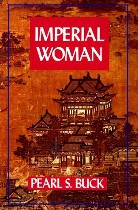 Pearl Buck •
Pearl Buck •
Imperial Woman •
Of the many books written about China’s last empress, Pearl Buck’s fictionalized account probes deepest into the character of this remarkable woman. Buck was raised in China by missionary parents; she knew the people and culture intimately at a time when few Westerners had set foot in the Middle Kingdom. Here she weaves a tale as gripping as any thriller, drawing on her own recollections as well as myriad historical documents.
Tzu Hsi—or Yehonala, her clan name—distinguishes herself from the moment she arrives at the imperial palace. This insolent young Manchu girl presents an utter contrast to the timid, quaking creatures paraded before the emperor for his review. Small wonder she is chosen as a concubine.
Tzu Hsi bears the emperor a son and eventually ascends to the Dragon Throne. Plots and intrigue are daily fare in the Forbidden City; Tzu Hsi has only one person she can trust, a kinsman who has pledged himself to her service, come what may.
The court’s advisors marvel at her shrewd judgment and grasp of affairs of state. Tzu Hsi’s nerve never deserts her during a long, eventful reign; she buries a husband and a son, sees her palaces burned and her armies defeated, copes with treachery and rebellion. Through it all she keeps her own counsel, showing the world an implacable, haughty face, and reserving her suffering for private moments.
Buck tells us in the book’s foreword that despite the political upheaval during Tzu Hsi’s rule, the peasants in China revered and adored the empress. On learning of her death, they cried, “Who will care for us now?”






You jumped into my brain again – that is a book I have upstairs in my library to be read this year. Actually re-read, since I was a devoted Pearl Buck fan in the 1960’s. With China opening its doors, her books have a renewed relevance… and they all are just darn good reading!
Good to hear from you, Fran! I agree, Buck’s storytelling is just mesmerizing.